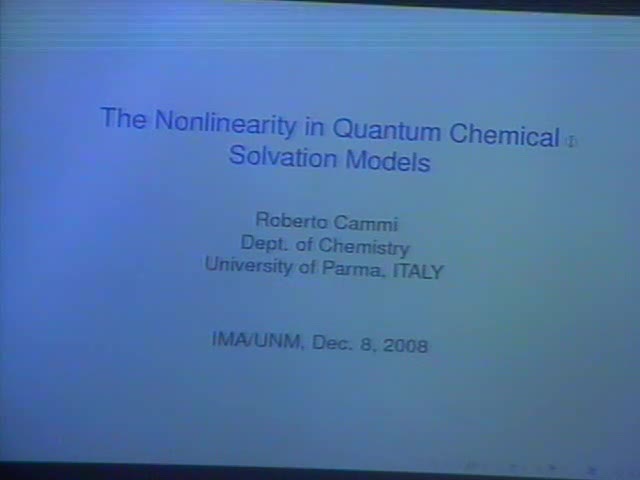An overview of the non linearity in Quantum Chemical continuum solvation models
Presenter
December 9, 2008
Keywords:
- Quantum chemistry
MSC:
- 80A50
Abstract
Quantum chemistry computational tools coupled with a continuum description of the solvent offer an effective approach to study molecular properties and processes in condensed phase due to modest increase of the computational effort with respect a QM calculation of isolated molecules [1].
However, this coupling is by no meas free of problems. The QM continuum models are characterized by the use of a non-linear Hamiltonian, being the solute Hamiltonian term representing by the solute-solvent interaction dependent on the wave-function of the solute it selves. As a consequence all the conventional Quantum Chemical models to be able to describe in a coherent way the effects of the solute-solvent interaction have to be reconsidered from their basic principles and suitably modified to take into account of this non linearity. The neglecting of this effects may lead to a systematic errors in the numerical outcome of the QM solvation models.
In this talk we will give an overview of the systematic work done within the Polarizable Continuum Model group to introduce the non-linearity effects into the Quantum Chemical methods. The emphasis will be given on the basic principles and problems involved. In particular we will focus on the definition of a new basic energetic functional [2] , different, from that used for isolated molecules, which has to be taken as a starting point to develop QM methods for continuum solvation models.
A wide sample of QM-solvation methods will be also discussed, ranging from the ab-initio time independent methods (Hartree-Fock, MC-SCF, Moeller Plesset) to the corresponding time-dependent response function formalisms, and from the the Density Functional Theory to the Time dependent DFT approach to the excited states of solvated chromophores.
Final remarks will regards some still open issues in the coupling of QM methods with continuum solvation models.
[1] Tomasi J., B. Mennucci, Cammi, R. "Quantum Mechanical Continuum Solvations Models", Chem. Rev., 2005, 105, 2999.
[2] Cammi, R., Tomasi, J. J. Comp. Chem. 16, 1449, 1994
